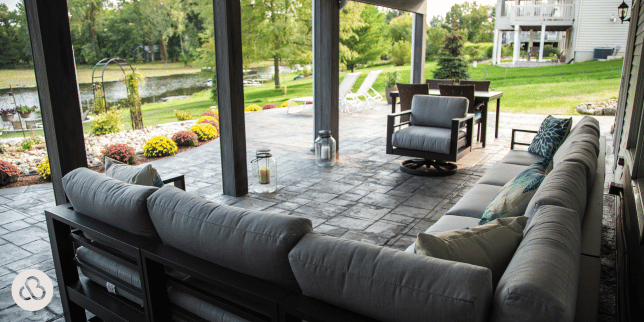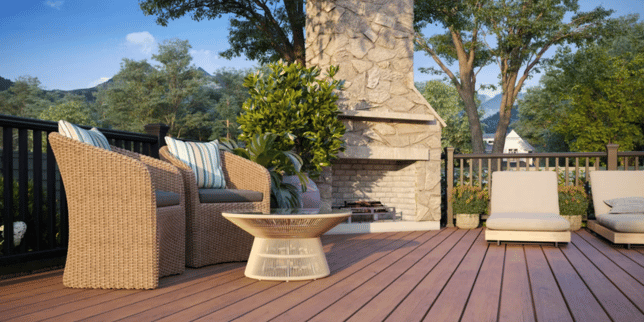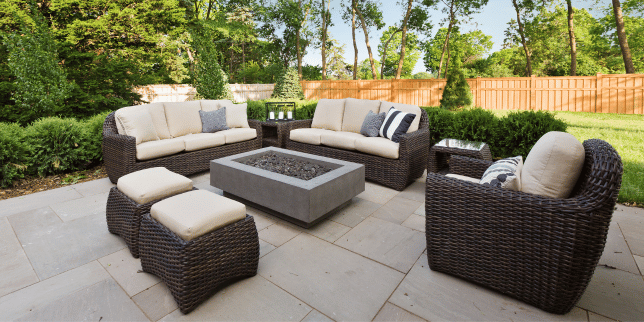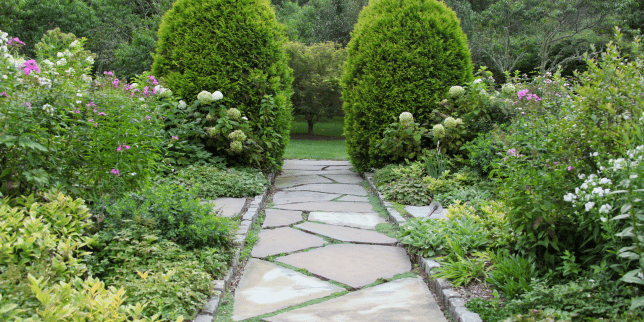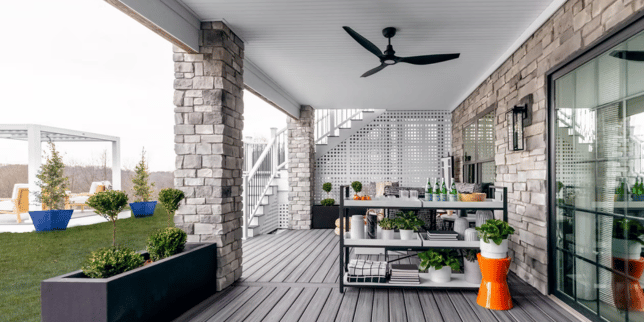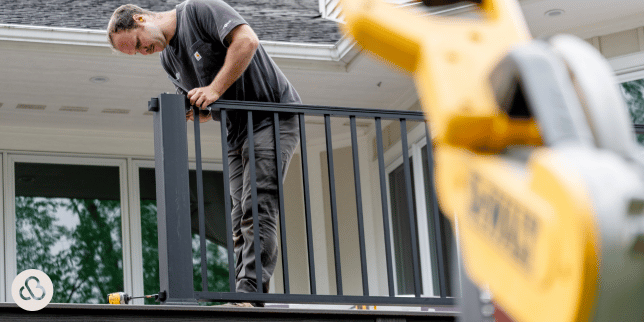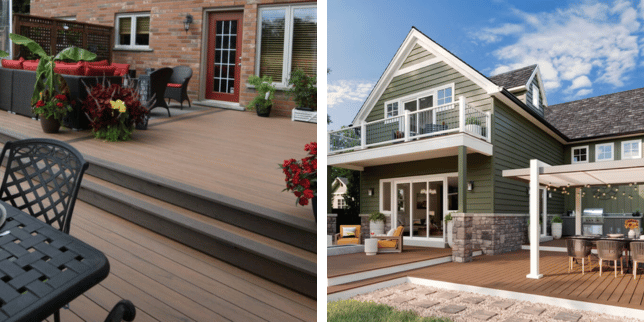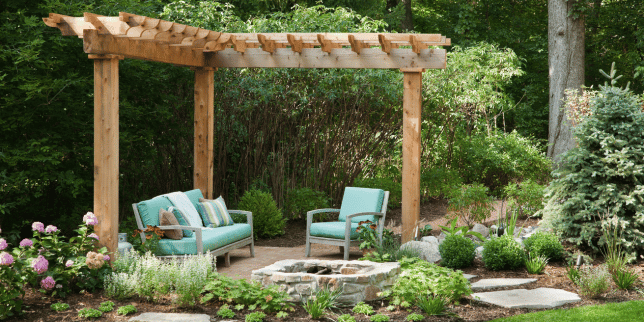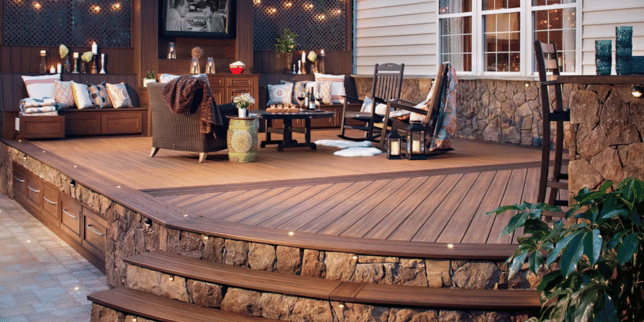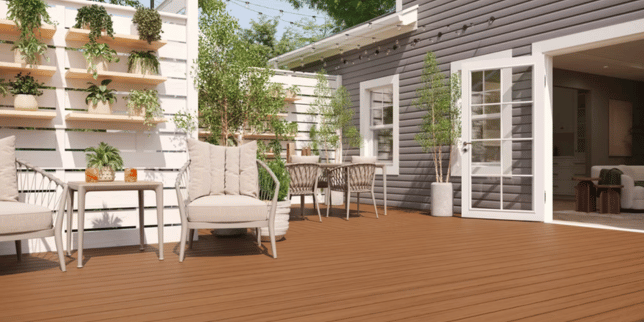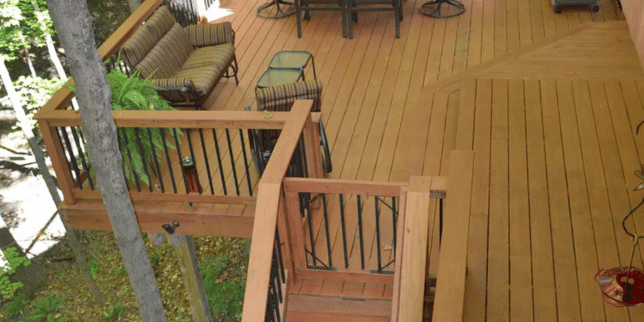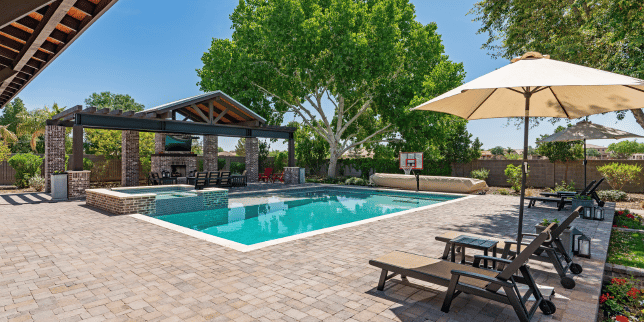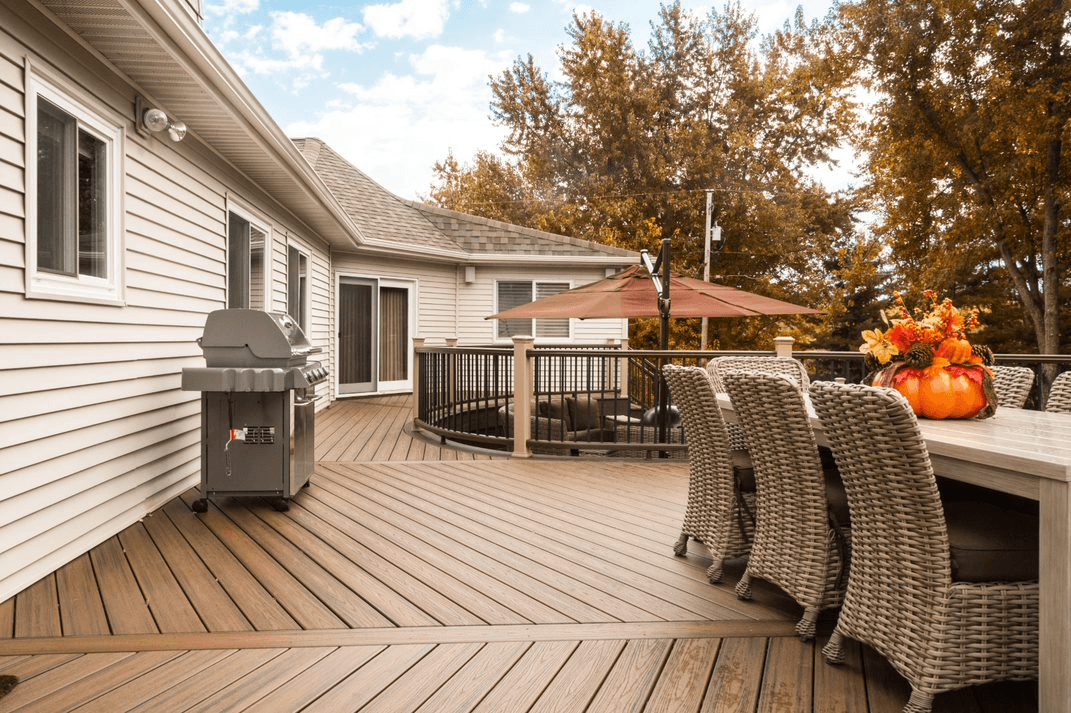
How To Clean a Composite Deck
Low maintenance options and cleanability are among the top reasons to choose composite decking for your outdoor project. While composite materials have these benefits, there are specific cleaning and maintenance practices required to keep your deck in good condition.
Helping our clients maintain their decks is part of the “5-star experience for life” that Custom Built offers. Getting educated about proper composite deck cleaning methods will help ensure your deck stays in great condition.
With some knowledge, composite decks can be easy to keep clean and maintained because they are designed to last for decades.
Using the following methods, common outdoor messes can be easily cleaned and long-term damage to your composite deck can be avoided.
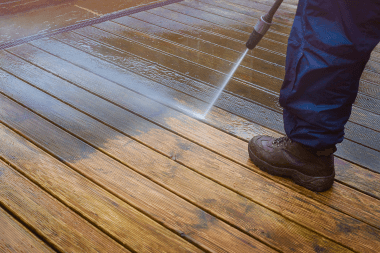
Should you use a pressure washer on a composite deck?
While most messes and stains on composite deck boards can be cleaned using a garden hose and soft bristle brush with appropriate cleaning products, a pressure washer may be used if guidelines are carefully followed.
Be advised: Do not use a pressure washer at greater than 3100 PSI. This level of power washing may damage the deck boards and void your warranty.
What messes on a composite deck are best for pressure washers
Pressure washers work great for common messes such as dirt or mud that are easily washed away. For the other types of messes, it is best to follow the steps provided.
How to clean dirt and debris off a composite deck
Generally, you’ll follow 3 main steps for cleaning dirt and debris off a composite deck:
- Mix dish soap and water, then place on the deck
- Scrub the affected area with a soft bristle brush and soapy water
- Rinse away with water
While that is the general method of cleaning dirt and debris, the specific method may change based on the type of dirt and debris, as you’ll see below.
Using this technique will not damage the composite material or fade the color of the deck.
The best method for cleaning the different kinds of dirt and debris listed below is a preventative one. However, if you are in a situation where that was not an option, below are some ways to clean oil, grease, and food particles; mold and mildew; tree debris; and hard water stains.
Using this technique will not damage the composite material or fade the color of the deck. The earlier that dirt can be removed the better to maintain your deck’s longevity.
How to clean oil, grease, and food particles off a composite deck
Food contains all sorts of chemicals and has different Ph levels that may fade and stain the deck color. It’s best to play on the safe side and clean the food off the deck as soon as possible.
Here are the 4 steps to clean oil, grease, and food particles off a composite deck:
- Clean the mess as soon as possible to keep it from setting in the textured grains of the deck boards
- Use warm soapy water/cleaning solution and a soft bristle brush to scrub away the mess
- Rinse thoroughly with water
Mold and mildew
If mold and mildew form, it can damage the color of the deck and leave permanent discoloration, therefore clean it as soon as possible.
Use the following steps to remove mold and mildew:
- Sweep the deck surface, removing any leaves, pine needles, or dirt
- Rinse off the deck using either a garden hose or a power washer
- Scrub the mold and mildew with a soft bristle brush, using either warm soapy water.
- Rinse thoroughly with clean water
Tree debris
Decks are commonly built nearby trees. An unintended consequence of this is having debris from the tree, such as sap, leaves, pollen, and animal droppings fall on your deck.
Use the following steps to remove tree debris:
- Sweep leaves, pollen, droppings, pine needles, and pinecones off the deck
- Rinse off the surface of the deck with a garden hose or pressure washer
- Use warm soapy water to remove tree debris from your deck
- In the event the tree debris is concentrated and will not be removed using warm soapy water, use CitraSolv® Concentrated Cleaner & Degreaser in the recommended proportions to remove tough tree debris stains
- Rinse thoroughly with clean water
Hard water stains
Water with higher-than-average mineral content can discolor a deck if it dries on the surface.
To clean hard water stains, use the following method:
- Rinse the deck down with clean water from a garden hose
- Remove the hard water stain using white vinegar with a soft bristle brush
- Rinse thoroughly with clean water and dry immediately with a towel or leaf blower if using the same hard water source for rinsing
As hard water dries on a composite deck, the minerals from the water are left behind and may leave noticeable spots on the surface.
Removing ice and snow
Composite decks are designed to withstand harsh winters full of ice and snow.
However, to properly remove ice and snow from a composite deck, use the following tools:
Plastic shovel to avoid scratching the composite. (metal and metal-edged plastic shovels should be avoided)
Calcium chloride or rock salt to prevent or melt ice.
While composite decks incorporate hardener compounds to reduce scratches, they are not scratch-proof.
Avoid scratching the composite surface
As mentioned earlier, composite deck boards are made with hardeners to resist scratches. This does not, however, make them scratch-proof.
Composite decking product lines have varying levels of hardening compounds in the shells of the deck boards. Better-performing deck boards like Trex Transcend are more resistant to scratching than entry-level deck boards, such as Trex Enhance.
Selecting a better-performing composite deck board during the design process will aid in avoiding scratches in the future.
The following tips will help you avoid scratches on your composite deck:
- Place an outdoor rug under outdoor furniture to act as a protective barrier
- Do not drag heavy, metal objects across the surface. Lift them up before moving them
Preventing scratches will help to keep your deck looking clean and sharp for decades.
How to avoid scratching a composite deck when removing snow and ice
Scratches occur most commonly when using a metal shovel to remove snow and ice.
Use only plastic shovels to remove snow and ice from a composite deck.
Next steps for your composite deck
Cleaning a composite deck is easy compared to maintaining a traditional wood deck.
Using the cleaning tips provided in this article will keep your deck clean and in great condition for years to come.
If you have further questions about maintaining your composite deck, Custom Built would be happy to assist you. We have been designing and building custom decks in the Mid-Michigan area for over 15 years and understand the care required to keep a deck in good working condition.
Now that you've learned about how to properly clean your composite deck, let's explore the top differences between composite decking and wood decking, the top deck designs to consider for your project, and how much your deck replacement will cost:
-
Top 10 Differences between Trex Composite and Wood Decks - A guide that compares the performance and cost of Trex composite decking and wood decking.
-
The Deck Design Guide - From multi-tiered levels to lighting systems, this article highlights trending deck designs you should use for your outdoor living space.
-
What is the Average Cost of a Deck Replacement in Lansing, Michigan? - Replacing your deck soon? Learn more about your future replacement's costs and the factors that affect the price.
Michael brings over 2 decades of building and remodeling experience to his position as the Owner and Visionary of Custom Built. Michael’s passion to make an impact on the home building industry has led him to serve for over ten years at the local and state Home Builders Association, culminating as President of the HBA of Michigan in 2020.














